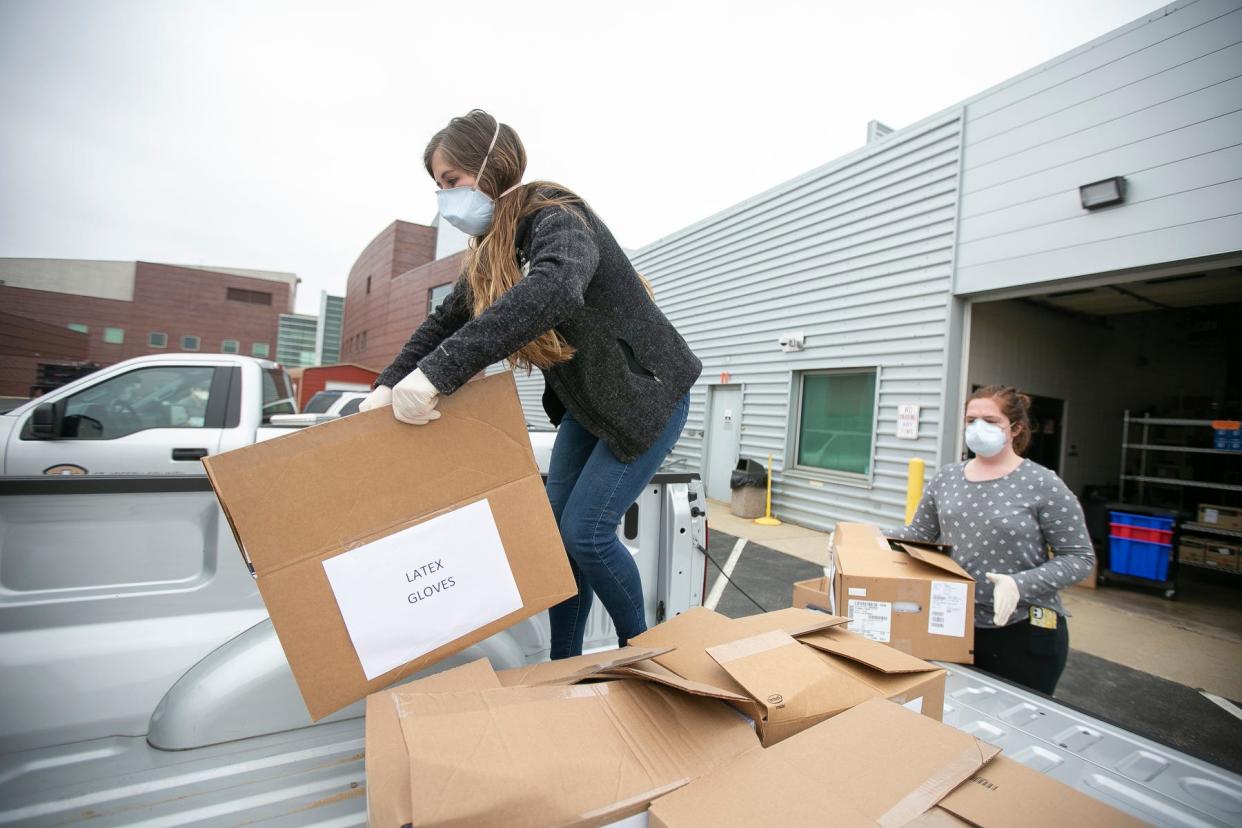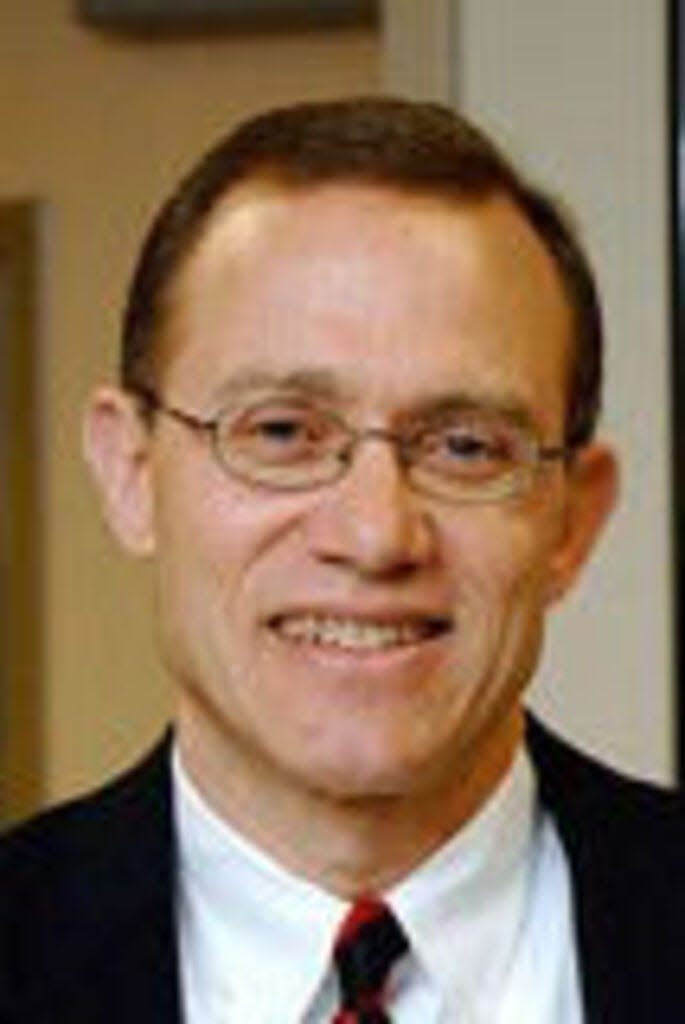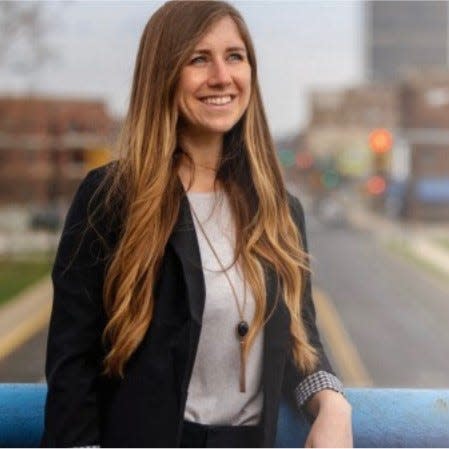Staff leave health department under political scrutiny. Big state dollars still loom.

SOUTH BEND — The St. Joseph County Health Department is suddenly losing key employees, which its health officer, Dr. Joseph Cerbin, said has caused some internal “angst.”
As of June 8, eight positions were posted at the county’s job site, including the health officer — more than any other county department. But sources for this story suggest there could be at least one or two more departures than that.
Two of the departing staff cite anxieties and uncertainty after political leaders questioned the focus of their work: health equity.
Viewpoint: Politics afflicting public health in St. Joseph County
Cerbin, who’d signed onto the job saying he’d stay only four months, is threading his way between intense political pressures while he prepares the dwindling staff to seek a piece of almost $200 million that the Indiana legislature passed this year to expand county health services across the state, some of it aimed at prevention.

The funding comes out of the Public Health Commission that Gov. Eric Holcomb established to pull Indiana out of 45th place in public health spending.
The deadline to apply is Sept. 1. Cerbin plans to depart at the end of July.
And at 4:30 p.m. June 12, the county health board will hold a special meeting to vote on their appointment to replace Cerbin. Five doctors had applied as of last weekend, two of whom had been interviewed, health board President John Linn said.
“I’d like to see what new programs we can institute,” Cerbin told the board on May 24. He was asking his staff and the board for wish lists, diplomatically stopping short of naming anything in specific.
“This is not a dictatorship,” he’d told The Tribune earlier. “We want to recommend programs that everyone likes."
That’s because the potential windfall would require a set of core services and standards, which has made certain conservative leaders nervous. Republican Amy Drake, who sought her county council seat because she saw local mask mandates for COVID-19 as an overreach of the department’s power, has written commentaries that slammed Gov. Eric Holcomb’s funding effort as a power grab, giving the state more influence over local government. She went to Indianapolis on Feb. 1 to testify against the legislation.
“Our issue is that we don’t want to opt into that and have so many strings that we’re not able to make the decisions we want for our people,” Drake told legislators, saying that she spoke on behalf of all other Republican council members and commissioners.
St. Joseph County stands to gain from $3.1 million to $4.2 million, according to local officials, but only if it opts in.
If it chooses to do so, the county would have to ensure that a list of 23 core services are available, either through the health department or through partners in the community.
They include 10 things that health departments already do, including immunizations, maternal and child health, communicable disease prevention and control, and public pool inspections.
They also include 13 things that haven’t always been handled by health departments (though some do), such as tobacco prevention and cessation, emergency preparedness, and prevention of chronic diseases such as obesity, diabetes and hepatitis C.
If a core service is already available, the department can use the state funding for another public health issue.
The department would have fairly broad control over where it choses to spend the money. In the end, the county will have to report on the state’s key performance indicators, along with indicators that its health department develops.
Scrutiny spikes for health department
Drake started her term in January after the fall elections flipped the council from a 6-3 Democrat majority to 5-4 Republican control. Since then, she has raised the level of scrutiny of the health department. She chairs the council’s Human Services/Criminal Justice Committee that reviews health department funding and initiatives.
Drake claimed that, under prior health officer Dr. Bob Einterz, the health board wasn’t reviewing and approving grants, instead taking them directly to the council and commissioners.

“When I took over as (committee) chairwoman, I told the health department the council could not consider salary changes and grants until they received approval from the board, per state statute,” she said.
She also has said that she feels the department had become “extremely politicized” under Einterz, seeing it as an “outgrowth of their Democratic advocacy wing.” She has led her four fellow council Republicans on votes to turn down health department grants from sources that she saw as pushing an agenda.
Einterz announced in December that he'd resign at the end of March, citing what he called the commissioners' “harassment of the health department,” especially when they didn't immediately support funding for a behavioral crisis center.
Along with fellow council Republican Dan Schaetzle, Drake also raised concerns over “equity” language on the health department’s website that she characterized as “Marxist/critical race theory.” It slowed, though didn’t stop, the council’s acceptance of a $100,000 grant to expand awareness and access to the overdose drug naloxone.
May 18, 2023: Drake holds up overdose grant. Claims health department 'equity' language is Marxist.
Drake said her concerns eased after a long talk with Cerbin, feeling assured that he’d keep political ideology out of health work.
“I told her we’re just interested in doing public health,” Cerbin said. “We’re not interested in getting involved with either party’s wheelhouse.”
But his mind is also on the potential state funding and the local support he’ll need, as he said: “I’ve spoken with a lot of them (political leaders) and want to meet with all of them and get as much political support as possible.”
When asked about that new funding, known as Senate Enrolled Act 4, Schaetzle told a WVPE reporter that he’d rather deal with definable health metrics like infant mortality rates than what he called the “political banter” of equity and racism, adding, “I think that gets nothing done when you end up with studies that focus on, well, do we have a racism problem?”
The legislation doesn’t seem to call for anything to address equity or racism.

Tensions mount on all sides
In general, Cerbin said, he’s been “getting misconceptions cleared up and getting people on the same page.”
He believes that proponents on all sides agree on 90% of what they’re debating.
Still, the conservative inquiries had led some in the community to feel that the health department was under attack. The local NAACP even called it a “war on public health” as it pointed to debates, for example, over county support for a behavioral crisis center, Motels4Now and Portage Manor.
There has been tension on all sides.
When the NAACP planned an early-morning protest on health issues May 4 in front of Drake’s house — which ended up with nearly a dozen people — Drake called it “domestic terrorism” because she was concerned for her children.
On the county’s board of commissioners, Republican Derek Dieter felt the spillover of criticism this spring. While keeping his distance from the council’s actions, he declared at a meeting in April that, “The war on public health does not exist,” as he counted the number of health-related bills that commissioners themselves did pass.

But Cassy White, who just quit as director of the department’s Health Equity, Epidemiology and Data Unit, or HEED,pointed out that it was taking at least a couple of months longer to approve funding in certain cases, adding, “It’s delaying the ability for us to do our work in a timely manner.”
Viewpoint: Health equity is a worthy goal. But somehow, it's become a four-letter word
One such delay, she said, was the contract with the local marketing firm Force 5 to promote the community health workers. The idea is to raise public awareness so more people could be served by the team of workers as they promote better maternal and infant health and lessen the risks of childhood lead poisoning and COVID infections. The department is now working through details to get it started.
Employees speak of 'hostile' environment
White's last day was June 2. The other departures, she said, stem from similar tensions.
She said she felt the county council, commissioners and health board “made it clear that they do not support health equity and advocacy in the health department.”
“I want to work for a place where the leadership supports health equity,” she said.
Certain county leaders may disapprove of the term “health equity,” but White said, “Most funding has health equity in it.”
As well, White said, staff had to implement changes requested by political leaders or the health board that felt like ”micromanagement.” For example, she said, the community health workers had to track where geographically they were going in their outreach visits.
“It came from people who don’t have a background in public health,” she said.
Of the jobs listed, two are community health workers, one is a public health coordinator who focuses on emergency preparedness, one is a staff assistant in environmental health, and one is a specialist who does inspections of and education about mosquito, tick and rodent issues. And Cerbin confirmed that an environmental health specialist retired after nearly 30 years in the department. That's out of roughly 80 people on staff.
“People don’t like change, that’s a human thing,” Cerbin said.

The HEED unit’s assistant director, Taylor Coats, also quit. Before then, at the health board meeting in April, Coats spoke of a board member who’d worked with a county council member and commissioners to “undermine” programs, specifically the community health workers, lead initiative and maternal health initiative.
“This creates a hostile work environment for employees, one that makes me feel unsafe in my daily work,” Coats said.
Coats told The Tribune this week that her physical and mental health started to suffer, adding, “It was no longer healthy for me to stay in the health department.”
Board shakeup: As GOP chair replaces 1 member of county health board, another resigns
She explained that she felt the funding for her position was under attack, with “consistent” questions from the health board and political leaders, all channeled through her department bosses. The questions particularly arose after a change in her job title, which originally was social worker, because of her expanded duties as she oversaw the community health worker program. Half of her salary was financed by the county’s lead grant funds and half from the federal Centers for Disease Control and Prevention.
“For my first year and a half, I had amazing chances to grow my skills under Dr. Einterz," Coats said. “After he left, we felt the heat. He (previously) took a lot of that heat.”
Board president says no shift of focus
At the same April meeting where Coats spoke, health board President John Linn responded to a public perception that the department’s focus was shifting.
“I think the shift that people are experiencing is the board’s deliberate actions to meticulously comply with all the laws, statues, programs, funding policies, personnel policies by which we are duty bound to comply with,” Linn said. “However, our strategic initiatives have not shifted. Our strategic plan is ripe with initiatives that are intended to identify and take action to reduce health disparities and move toward fair and just opportunity for all citizens of St. Joe County to attain their highest level of health. While we may debate and often disagree on which programs and policies should be implemented, … please know this is where the department would like to go in accordance with our current strategic plans. … We are still about health equity and advancing our strategic plans.”
Cerbin told The Tribune that “things are being reviewed” more now than in the past and said the department is more diligent about getting “quicker and more thorough” information to the county officials who vote on health programs.
Asked if political pressures played a role in the departures, Cerbin replied: “That may be. I don’t go into politics with employees.”
March 24, 2023: Einterz calls on voters to counter the politicization of public health by Republicans
But Heidi Beidinger, a Democrat on the board and its president until last year, has been vocal about not wanting to lose what she sees as great progress under Einterz. She'd recruited him and gives him credit for a “robust, equity-focused, data-driven health department.”
Now Beidinger said she’s “extremely concerned” about the exodus of key staff and how that loss of skill and talent will hamper the department’s pursuit of the new state dollars.
“We’re committing to do a lot of things,” Beidinger said. “We’re going to run into issues trying to meet our obligations."
“Those folks will be missed greatly,” Cerbin responded.
White said that one of the community health workers who quit, a mother who focused on maternal health, was frustrated when a community conversation couldn’t be organized because the county council held the funding for it.
“There was a new level of toxicity and anxiety that was created because of the constant questioning, while at the root of it, we just wanted to be serving the community and helping it to be the healthiest it could be,” White said. “To constantly have to explain yourself is exhausting when all you want to do is work.”
South Bend Tribune reporter Joseph Dits can be reached at 574-235-6158 or jdits@sbtinfo.com.
This article originally appeared on South Bend Tribune: St. Joseph County Health Department staff quit political questions

